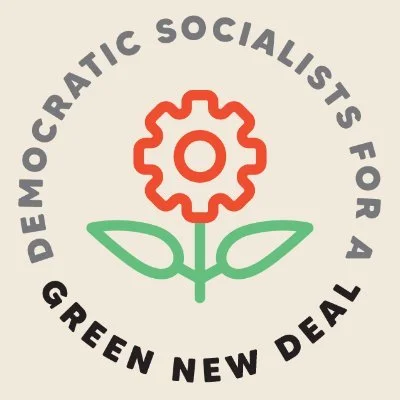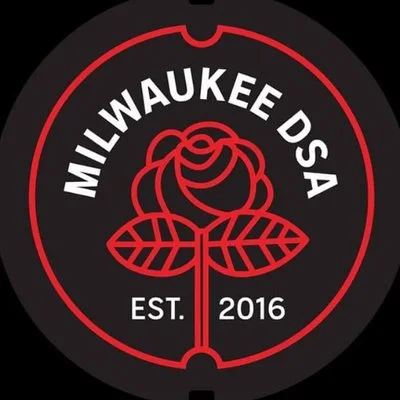

Book Review: 'What’s Left'


Addressing the Betrayal of the Black Community and the Need for Unity Against Fascism


A Hyperrealist Afterlife in Mark Fisher's "Flatine Constructs"


The Emerging Boycott Movement Against MAGA


Rank-and-File Organizing: Letter Carriers 1970–1978


Metro DC DSA Elects Eclectic Delegation for the 2025 National DSA Convention


Being Disciplined in an Online World of Cruelty


Mass Call: The Fight for a Socialist Green New Deal
Hear from union leaders, DSA campaign organizers, and socialists in office who are continuing the fight for a better future. Given the hostile federal terrain we now face, local pressure campaigns in our communities and bargaining for the common good in our union contracts are the most viable pathways for winning a socialist Green New Deal this decade.
Speakers
- Thea Riofrancos (author, A Planet to Win: Why We Need a Green New Deal)
- Ashik Siddique (DSA National Political Committee, Co-Chair)
- Sarahana Shrestha (Mid-Hudson Valley DSA, Assembly District 103)
- Kelsea Bond (Atlanta DSA, council candidate)
- Alex Brower (Milwaukee DSA, Common Council District 3 representative elect)
- Michael B (Louisville DSA)
- Sam Z (DSA Los Angeles)


Milwaukee DSA calls for peace, not escalation, after Israel and the U.S. launch war with Iran
The Milwaukee Democratic Socialists of America [DSA] condemn the U.S. and Israel’s war with Iran and demand that U.S. leaders move towards disengagement instead of continuing the destruction of the region.
After decades of crying “nuclear,” Israeli Prime Minister Benjamin Netanyahu and American President Donald Trump have sparked a hot war that will directly impact 90 million Iranians, 10 million Israelis and 4 million Palestinians living in the region. It will also indirectly affect people around the world, including those in Milwaukee, as the economic impact takes hold.
“This is yet another example of unnecessary American intervention in the Middle East,” Milwaukee DSA leader Pamela Westphal said. “While thousands of Americans every day struggle to have adequate access to food, shelter, water, education and transportation, the U.S. government uses the same taxpayer dollars that could alleviate these problems to bomb innocent civilians in Iran.”
Though Trump has characterized this initial attack as necessary to bring peace, we recognize the self-fulfilling nature of a nuclear nation baiting and bombing another nation over unproven claims of that nation’s combative intentions.
Already, Israel, the U.S. and their allies have spent decades destabilizing the region. In the past three years, Israel’s escalated ethnic cleansing of Palestine alone has led to international charges of war crimes and condemnation from countries around the world.
“To our Iranian brothers and sisters in Milwaukee and beyond, I pray for your safety and healing as this war is reignited,” Westphal said. “And to our Muslim neighbors here in Milwaukee, we stand in solidarity with you against Islamophobia and U.S. intervention in the Middle East.”
Just a generation after the horrific occupation of Iraq, Americans should know better than to beat the drums of regime change or to join a war that has already cost hundreds of civilian lives. Iraq, Libya, Syria, Yemen and Afghanistan remain battered by American and allied meddling, their communities facing some of the world’s worst living conditions. We hope U.S. leaders will do the right thing and move towards immediate peace instead of continuing down a long road of death and destruction.
Milwaukee DSA is Milwaukee’s largest socialist organization fighting for a democratic economy, a just society, and a sustainable environment. Join today at dsausa.org/join.


The time for fence-sitting, apolitical unionism must come to an end.
Note: posts by individual GMDSA members do not necessarily reflect the views of the broader membership or of its leadership and should not be regarded as official statements by the chapter.
Below is a speech made by Green Mountain DSA labor chair, Andy Blanchet, on June 10th, 2025 at the Burlington, VT ICE OUT protest. The protest brought together people across the Vermont community - from union & migrant workers to retirees and community organizers - to stand in solidarity with the community of Los Angeles, CA in their resistance to government repression.
GMDSA’s Labor Committee recently worked with rank and file union members in putting on a Union Power organizing training in April 2024, and was a key organization in coordinating and organizing the May Day 2025 March in Williston, VT where 2,500 people came out to celebrate international workers’ day and stand in solidarity with Vermont migrant farm workers in their Milk with Dignity picket line at Hannaford Supermarket.
Repeat after me: An Injury to One, is an Injury to all! (x3)
Hello! My name is Andy Blanchet and I am a full-time worker at Howard Center, and speak today as president of our labor union, AFSCME Local 1674, and as chair of the Green Mountain Democratic Socialists of America Chapter’s Labor Committee. I come with an urgent message for fellow working class people and our role in combating Trump’s Authoritarian cruelty as witnessed in LA and beyond. I first want to state clearly: AFSCME Local 1674 stands in solidarity with all who have been kidnapped by ICE and DHS and we demand the immediate release of those currently detained. We stand in solidarity with every Union member on the streets exercising our right to freedom of speech in calling for an end to the cruel ICE raids. These unacceptable state sponsored acts of kidnapping are both horrific and unsurprising from this administration. Unsurprising, considering capitalism’s fundamentally authoritarian nature.
We currently live in a world where bosses who run corporations have full authority over workers. This is an ugly dictatorship of capital - where those who make profits from the blood, sweat, and tears of workers can decide exactly what kind of lives we are allowed to live by exploiting our time and energy for the sake of profit. Not only that, but the capitalist landlords, who pay for their new pools and 2nd homes with our meager wages we break our backs for, decide exactly how much to extort from us in exchange for shelter. Workers have historically worked to combat this dictatorship of the bosses by forming our own labor and tenant unions.
And with that collective organizing, working class people have tried to exercise our natural rights to free speech, organizing, freedom of association, and collective bargaining to win both better wages and working conditions, as well as political change. However, every step of the way, the rich have fought us tooth and nail for even the most meager of wins. They hire union busting lawyers from an industry that reaps profits by convincing employers to keep them on retainer in order to fight their own workers simply pursuing dignity and respect in the workplace. They call the police on striking workers, like they did to Starbucks Workers’ United members during their sit-down strike earlier this year. The rich have even gone so far as to OUTLAW the ability to strike, to withhold our labor, in different industries. That didn’t stop unions like the Newton Teachers’ Association of Newton Massachusetts from organizing a successful, and illegal, strike to win their demands.
But now, it seems, the rich bosses want more. They criminalize working people from speaking out in support of Palestine through the critique of our own country’s complicity in the ethnic cleansing and genocide of the Palestinian people. ICE beat & detained the President of SEIU California, David Huerta, while he exercised his freedom of speech. The rich are willing to target unions, union workers & leaders, and immigrant workers to maintain their full control over our economic, political, and social lives. And it is essential that every union, be they local or international, answer the question: Which side are you on?
The time for fence-sitting apolitical unionism must come to an end. There are numerous examples of unions trying to play-nice with overtly hostile political administrations, thinking this would save them, and it never has. All this does is allow those in power to exercise their will over organized labor and know they can get away with it. Worse than that, the do-nothing Democratic party has used the plight of working class people as their political platform for decades. Workers are not pawns to be used in rhetoric and then discarded when it’s time to make good on policy promises - working people are who have built and sustained society and we deserve money for healthcare, prenatal & child care, education, housing, and food, not money for bombs and deportation! It is well past time for unions, big and small, to recognize these trends and organize to win the future we all deserve.
We can win these demands, and more, if we recognize and internalize that when we are divided, and alone, we are at risk. But when we practice safety through solidarity, we are unstoppable! Look at what organized labor did to energize the working class of South Korea in 2024. By organizing workers in huge companies into strike-ready unions and collaborating with farm workers, Korean workers were able to mobilize and fight back against President Yoon Suk Yeol’s declaration of martial law in a fight for democracy. We, the workers and organized labor, must find the political will to commit to this version of organizing for the common good in order to have a lasting impact. We deserve lives of dignity, honor, love, and justice!
The workers, united, will never be defeated! (x3)
Thank you! Solidarity Forever!